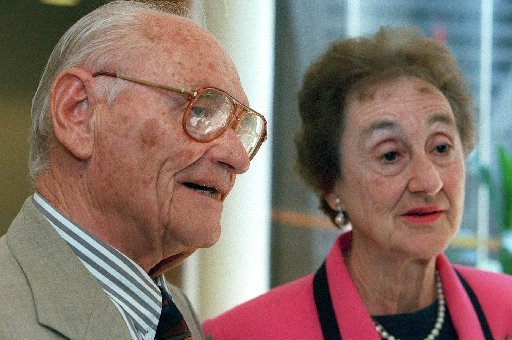Sonja Messerschmidt was a positive, humorous person despite her experience as a prisoner in the concentration camps of Nazi Germany.
“She was an absolutely unusual person,” said her husband, Kurt Messerschmidt. “Despite of all the miseries, she, in her mind, stayed above all these things. Things a normal person would have a hard time to survive.
“Not only did she herself survive, but she helped other people regain their spirits,” he said. “She was always encouraging all the good things in life.”
Mrs. Messerschmidt died Monday. She was 85.
She met her husband of 66 years when he was her teacher at a private school in Berlin.
When her family was deported in the spring of 1943, she hid from the Nazis with him and his family.
They were subsequently deported to Theresienstadt, a concentration camp in Czechoslovakia, where the couple married in April of 1944.
It was another six years before the couple immigrated to New York City.
They were drawn to Portland in 1951 by an opportunity at Temple Beth El, where Kurt Messerschmidt served as cantor for 35 years.
Without family or friends, the Messerschmidts were welcomed to Portland by the congregation. Her husband said the congregation quickly became their family, and Portland became their home.
“If you could see her admire the beauty of Maine,” he said. “She just took these things in with such delight and joy of life.”
Mrs. Messerschmidt had learned basic English while in Germany, but she had to adapt to conversational English in America.
Her husband said she had no trouble adjusting, especially in her role as cantor’s wife. Shortly after her husband began serving the synagogue, Mrs. Messerschmidt was asked to speak at an invocation. After asking her husband exactly what that meant, she studied material he recommended to her and delivered her speech flawlessly.
The couple raised two children, Eva Polisner and Michael Messerschmidt, both of whom remember their mother as a quick-witted person.
“She’d leave anyone around her laughing, but she did so in an unpretentious way,” her son said, never at the center of attention telling jokes, but delivering clever remarks.
For years, Mrs. Messerschmidt worked as the head of alterations for Ward Brothers, a women’s clothing store in South Portland. Her son said a co-worker of hers was so struck by the funny remarks she would make off the cuff that she actually kept a notebook of things she said.
“She had that amazing ability to cheer people around her,” he said, and her wit was more remarkable considering the challenges she faced in the concentration camps.
Mrs. Messerschmidt was a skilled seamstress, and always made clothing for her children. Her daughter remembers her mother telling her not to worry how something fit in the store, because she could make it fit perfectly with a few alterations.
Polisner didn’t inherit her mother’s sewing skills, but she did learn to cook some traditional dishes for which Mrs. Messerschmidt was known.
Mrs. Messerschmidt showed her daughter the process of making beef rouladen — from buying the right cuts of beef from a butcher to pounding the slices of meat.
“It would take a long time to make it, but everyone would get so excited when she did,” Polisner said.
When it came time for Mrs. Messerschmidt’s granddaughter’s bat mitzvah, she and her daughter and granddaughter went to the kitchen at Temple Beth El to make enough blintzes to serve everyone who was expected to attend the celebration.
“The blintzes were always a special treat,” her daughter said. “That was a nice memory to have, that we made those together.”
Staff Writer Emma Bouthillette can be contacted at 791-6325 or at: ebouthillette@pressherald.com
Send questions/comments to the editors.



Success. Please wait for the page to reload. If the page does not reload within 5 seconds, please refresh the page.
Enter your email and password to access comments.
Hi, to comment on stories you must . This profile is in addition to your subscription and website login.
Already have a commenting profile? .
Invalid username/password.
Please check your email to confirm and complete your registration.
Only subscribers are eligible to post comments. Please subscribe or login first for digital access. Here’s why.
Use the form below to reset your password. When you've submitted your account email, we will send an email with a reset code.